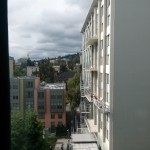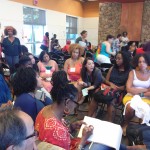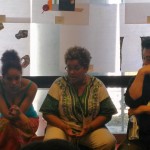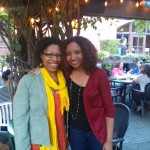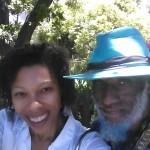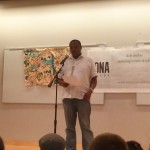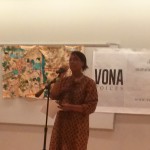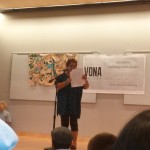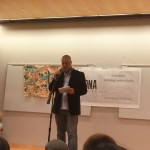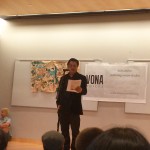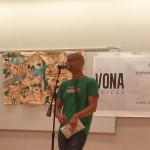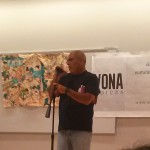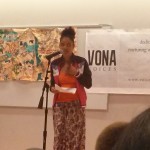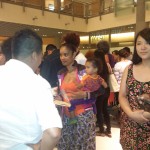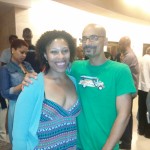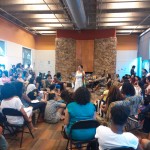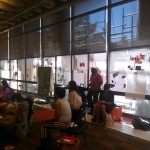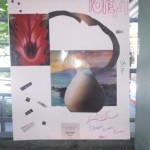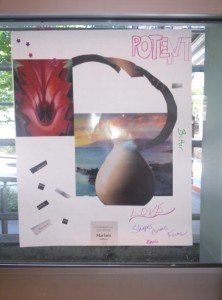
Each VONA participant created an “about me” collage. I think all my visual arts skills are gone, but I tried to show that I love sunsets, Georgia O’Keefe and feminist art; I’m still being shaped by lady power and other things; and my name means “potent,” not “bitter,” as I once thought.
UPDATE 7/7/2013: People who are better photographers than I am took tons of photos of everyone. Click here to see my faves.
The word I’ve used most often to describe my week of workshops in Voices of Our National Arts Foundation (VONA) is “intense.” Diem Jones, the executive director, often said that by the end of the week, we would know “the pleasures of exhaustion,” and I feel that. I also feel and know I’m connected to a larger family that spans the globe, and that wherever the workshops meet, I have a home there.
It is something to walk into a room of writers and see only writers of color. Indian, Hispanic, Latino, Chicano, Native American, Nigerian, African American, Asian–name a nationality or ethnicity, and I guarantee it was there. But also present was this consistent narrative of being voiceless or marginalized, and not always because of our color only. Many times it was because of gender (I estimate the group was 85% female), gender identity, or sexual orientation in addition to color. Sometimes it was the result of citizenship status. During a week in which I was trying to stay away from the news so I could concentrate on writing, the U.S. Supreme Court said DOMA was unconstitutional and provisions to secure voting rights for minorities weren’t needed. A Texas state senator filibustered for women’s rights. My U.S. senators voted against immigration reform. Everything people in VONA were experiencing was being debated and/or decided.
And we were learning how to write those experiences better. Staceyann Chin, my workshop leader, described herself as a “guts” workshopper. It wasn’t her mission to tell us which structure would work best for our memoir, or what punctuation mark was missing from our sentences. She wanted us to find the heart of our story, to know why we wanted to tell it, and to be unafraid to tell the world the ugly truths about itself and ourselves that even we don’t want to face. It was a week of tears, of confessions, and therapy. (Oh, and we critiqued each other and did some writing exercises, too.)
Point is, we wouldn’t have gone through all that if we didn’t have compelling stories to tell and if we hadn’t experienced our stories being repeatedly silenced. So although much of the week was challenging, uncomfortable, and at some points even hurtful, I would do it again.
The Voices week was inspiring, too, and I have to take a moment to thank two participants who stayed at the workshop the whole week, despite news of tragic losses in their families while they were there. One said she knew her loved one wanted her to be there, to become a better writer, and to tell her story. Having a voice is that important.
More insights coming throughout the week as I process all of it. Check out some photos of my week below.
- Window seat. Flying over Colorado.
- Prepared to write!
- View from my dorm room window.
- Writers of color gather at a publishing workshop.
- Staceyann Chin, Faith Adiele and David Mura talk publishing.
- Hanging out in downtown Berkeley with a Wash U friend.
- View from the hills.
- Another view from the hills. People actually live up there.
- Me and my dad. We’re way more sweaty and exhausted than the picture shows.
- I just like that this house has a tiny gate, so I took a photo.
- VONA Faculty reading was phenomenal! I captured most of them on camera, but unfortunately not all. This is Jeffery Renard Allen.
- Ruth Forman.
- Faith Adiele
- Mat Johnson
- David Mura
- Junot Diaz
- Jimmy Santiago Baca (who I was also delighted to see at the airport
- My teacher, Staceyann Chin, just before she shut. it. down.
- Staceyann Chin multitasking: signing books and holding babies. Moms.
- Me and Junot Diaz.
- Me in front of Berkeley’s legendary Yogurt Park.
- Mother Kira leading a celebration of life and writing on the last day of workshops.
- “About Me” collages.
- My “about me” collage.



